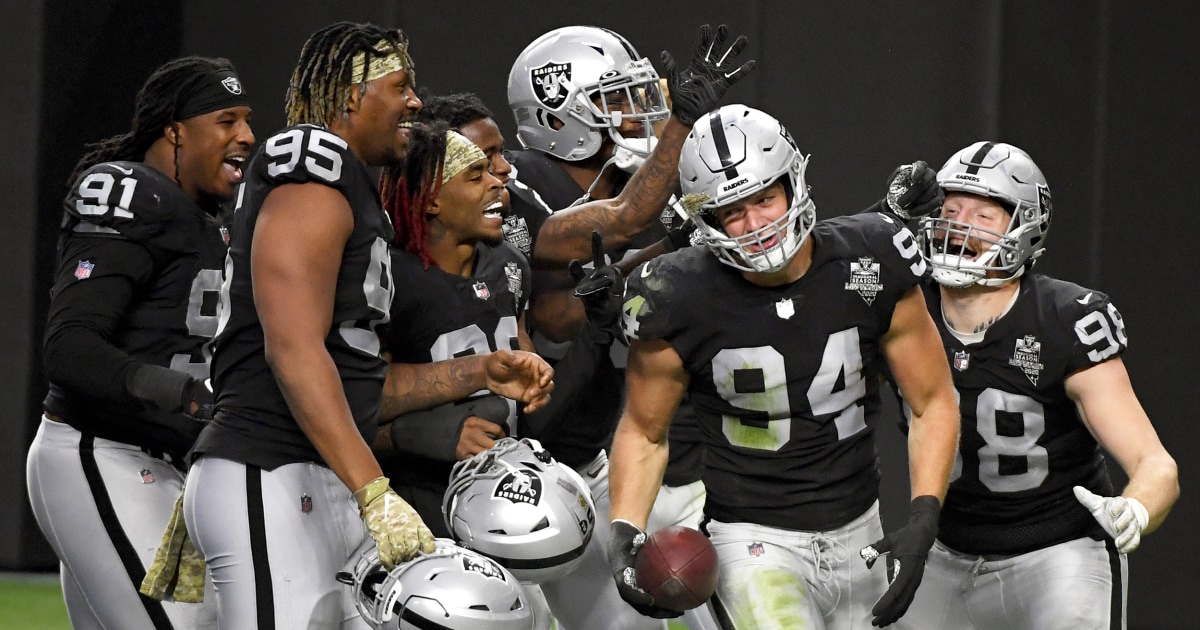
Hall of Fame quarterback Warren Moon says he thinks the reason several teammates of his did not come out as gay publicly during his NFL career had as much to do with the age-old “mentality” of the sport as it did with the era in which Moon starred for the Houston Oilers, and later the Minnesota Vikings, Seattle Seahawks and Kansas City during a 17-year career.
“We’ve had guys come forward in other sports, but never in a sport that’s so macho y macho, like professional football,” Moon told NBC News a day after Las Vegas Raiders defensive end Carl Nassib, 28, became the first active NFL player to publicly announce he’s gay.
“You’re taught at a very young age, as far back as Pop Warner, ‘Don’t show weakness. Don’t show injuries.’ If you were ever to say you were gay (when Moon played), that’d be like you were considered soft. I understand why guys wouldn’t come forward, just because of the mentality of the sport that they’ve been taught for so long.”
Moon played in the league from 1984 to 2000.
Nassib’s social media announcement — he posted a video on his Instagram account, which boasts 254,000 followers — received widespread praise and support from all corners of the NFL, including a statement from Commissioner Roger Goodell that said in part, “The NFL family is proud of Carl for courageously sharing his truth today.”
Moon, 64, called Goodell’s support “huge” and said that the league, and the country, have progressed a long way, even since 2014, when openly gay football player Michael Sam was drafted by the St. Louis Rams in the seventh round. Sam never ended up playing in the NFL.
“I think the league still wasn’t ready at that time. You could tell by where (Sam) was drafted (249th overall pick), based upon what he accomplished in college,” Moon said of the former University of Missouri standout. “Sam couldn’t make an NFL roster. So, things have taken a big change in our country. I’m glad to see that. I’m glad (Nassib) was courageous enough to come out.”
Former NFL defensive end Marvin Washington overlapped with Moon’s career for more than a decade, and Washington says he played with gay teammates at each stop in his career, beginning with the Jets in 1989. He also played for the 49ers and won a Super Bowl ring with the 1998 Denver Broncos.
“If you played one game in NFL, you played with a gay teammate,” says Washington, 55, who transitioned to the cannabis industry after his football career and is the founder of Isosport, a CBD sports performance company. “But just think about the time when Warren and I played. What was the acceptance of gays like in society then? It’s a totally different time now. It would have been different to come out 25 or 30 years ago. It would have been different with teammates, organizations, with society in general.”
Moon says one of his former teammates, Esera Tuaolo, came out after retiring, but that when they were together on the Vikings, Moon knew Tuaolo was gay.
“He was a really good player, and a great teammate, with an infectious personality. It was never a problem,” says Moon. “The guy could play.”
Moon says that he learned about his former teammates’ sexual identity “organically,” through conversations inside and outside the locker room. Whether the NFL at that time was aware that gay players were on team rosters, Moon says he doesn’t know. But because he was one of the few Black quarterbacks of his era, Moon says he faced discrimination and confronting that adversity helped him develop a strong “compassion and understanding for people being judged differently.”
“I felt my own discrimination during the time when I was trying to be an African American quarterback. People were using that against me,” says Moon. “I felt like I was different. There weren’t a lot of Black people doing what I was trying to do. Gay people have been discriminated against for a long time, and I’ve had my discrimination issues, too. That lended me to be more understanding of their plight.
“Nassib’s announcement is going to make him a better player, by freeing up his mind,” Moon says. “That’s one less secret that he has to keep from teammates. Now they know exactly who he is. It’s hard to be a leader if you’re not true to who you are. Now, he’s shown that he’s true to who he is by letting everybody know that. He’ll be a better leader and a better player.”
Cyd Ziegler, the co-founder of Outsports.com, says that a generation ago, very few people in society, let alone sports, felt comfortable coming out and that even though Sam getting drafted by an NFL team was momentous, “it just wasn’t the ending we all wanted” when Sam never ended up playing an NFL down. Nassib’s stature as a tenured Raider underscores the impact of his announcement.
“Nassib has a guaranteed contract,” says Ziegler. “He’s not going anywhere. I think the league has been hoping this would happen for a long time.”
But even Sam Rapoport, the NFL’s senior director of diversity, equity and inclusion, and who is gay, says that despite the overwhelmingly positive response to Nassib’s announcement, there is still much progress to be made with the LGBTQ+ community, both in sports and society. Rapoport says it was years after 2003, when she started working for the NFL, that she finally came out. And it was in the presence of Goodell at a party. She says Goodell was nothing but welcoming.
“The country and the world weren’t ready for it. No one felt comfortable coming out,” says Rapoport of her early years at the NFL. “Gay marriage was still not legal. Part of why Carl Nassib coming out is so impactful, I think, is it takes the first active player to come out and that will catalyze that movement. They’ll see that the waters are warmer than we thought. I see that happening in the near future because of Carl’s bravery, Michael Sam’s bravery and several other athletes who chose to take a risk while they were playing.”
Source: | This article originally belongs to Nbcnews.com










